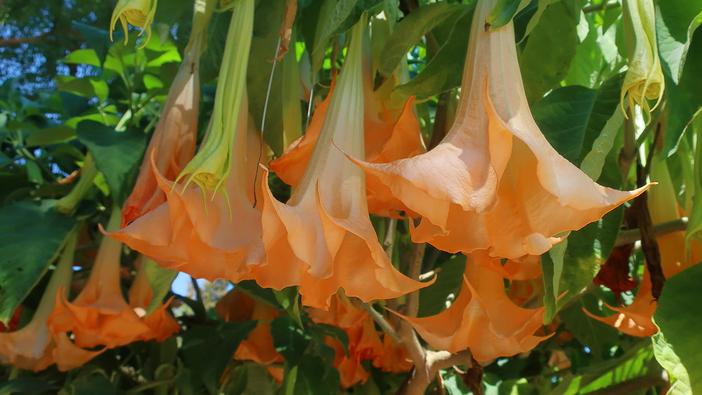Angel’s Trumpet
(Brugmansia versicolor)
Angel’s Trumpet (Brugmansia versicolor)
/
/

cultivar413
CC BY 2.0
Image By:
cultivar413
Recorded By:
Copyright:
CC BY 2.0
Copyright Notice:
Photo by: cultivar413 | License Type: CC BY 2.0 | License URL: https://creativecommons.org/licenses/by/2.0/ | Uploader: cultivar413 | Publisher: Flickr





















Estimated Native Range
Summary
Brugmansia versicolor, commonly known as Angel’s Trumpet, is an evergreen shrub or small tree native to the cloud forests of Ecuador. It typically grows to a height of 3.0–4.9 m (10–16 ft). The plant features large, elliptic to oblong leaves with smooth edges arranged alternately on the stems. One of its most striking features is the giant, pendulous flowers that resemble trumpets, which is the origin of its common name. The flowers are the largest among Brugmansia species, measuring 300–510 mm (12–20 in) in length. They bloom initially white and may age to shades of peach, pink, apricot, or remain white. The flowering season is not strictly defined, as the plant can produce blooms several times a year, particularly in warmer climates.
Angel’s Trumpet is celebrated for its dramatic, oversized flowers and is often used as a focal point in tropical and subtropical gardens. It requires a partially shaded to fully sunlit location, thriving in fertile, well-drained soils with average humidity. While it can tolerate temperatures slightly below freezing, frost can cause damage. The plant benefits from regular watering, especially during dry periods. Propagation is commonly achieved through stem cuttings, and it can also grow from seeds, though it does not self-pollinate. In cultivation, it is important to note that all parts of Brugmansia versicolor are toxic if ingested, and care should be taken to plant it away from areas frequented by children and pets.CC BY-SA 4.0
Angel’s Trumpet is celebrated for its dramatic, oversized flowers and is often used as a focal point in tropical and subtropical gardens. It requires a partially shaded to fully sunlit location, thriving in fertile, well-drained soils with average humidity. While it can tolerate temperatures slightly below freezing, frost can cause damage. The plant benefits from regular watering, especially during dry periods. Propagation is commonly achieved through stem cuttings, and it can also grow from seeds, though it does not self-pollinate. In cultivation, it is important to note that all parts of Brugmansia versicolor are toxic if ingested, and care should be taken to plant it away from areas frequented by children and pets.CC BY-SA 4.0
Plant Description
- Plant Type: Shrub
- Height: 10-15 feet
- Width: 7-12 feet
- Growth Rate: Moderate
- Flower Color: Yellow, Orange, Pink, White
- Flowering Season: Summer, Fall
- Leaf Retention: Evergreen
Growth Requirements
- Sun: Full Sun, Part Shade
- Water: Medium, High
- Drainage: Medium
Common Uses
Bee Garden, Bird Garden, Butterfly Garden, Deer Resistant, Fragrant, Hummingbird Garden, Potted Plant, Showy Flowers
Natural Habitat
Cloud forests of Ecuador
Other Names
Common Names: Arborescent Angel’s-Tears, Peach Angel’s-Trumpet, Campana, Rodnande Änglatrumpet
Scientific Names: , Brugmansia versicolor, Datura dolichocarpa, Datura versicolor, Brugmansia dolichocarpa, Brugmansia mollis, Datura mollis,
GBIF Accepted Name: Brugmansia versicolor Lagerh.